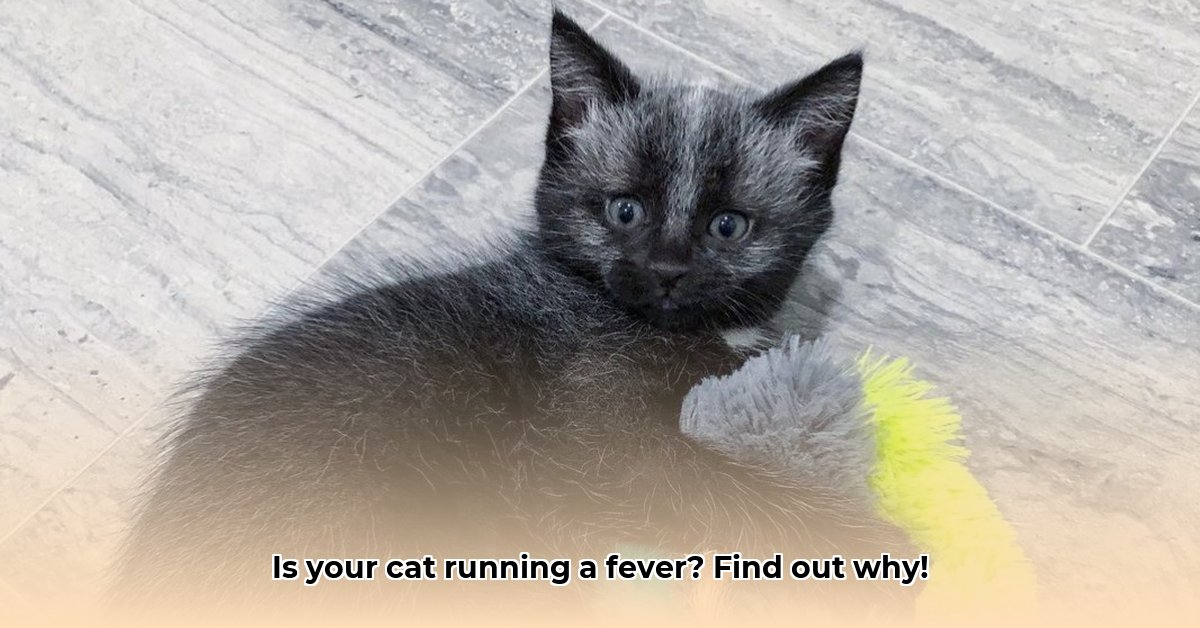# Fever Coat in Cats: Causes, Identification, and Comprehensive Care Guide
Have you noticed an unusual color or pattern in your kitten's fur, perhaps a lighter, silvery hue? This might be a "fever coat," a phenomenon that, while sounding concerning, is generally not a serious health issue for your kitten. This comprehensive guide will explain what a fever coat is, delve into its potential causes, provide guidance on identifying it, and outline the best approaches to care for your feline friend. For more on feline health, check out this article on [cat ear temperature](https://mearnes.com/cats-ears-are-warm/).
## Understanding Feline Fever Coat
If you've observed an atypical coloration in your kitten's fur, particularly a lighter or frosted appearance, they might have what is known as a "fever coat" or "stress coat." This condition isn't a disease in itself but rather a visual indicator suggesting the mother cat may have experienced stress or illness during pregnancy. The temporary change in the kitten's fur color serves primarily as a diagnostic clue.
### Defining Fever Coat: Characteristics and Appearance
A fever coat is a temporary alteration in a kitten's fur color, typically manifesting as a lighter shade than their natural coat. Common colors include silver, gray, cream, or even reddish tints. The color is often most pronounced at the tips of the fur, creating a frosted effect, while the roots of the fur may retain the kitten's expected color. The distribution of the altered color can be uniform across the coat or appear in patches.
Key characteristics of a fever coat include:
* **Temporary Condition:** The altered fur color is not permanent and will gradually fade as the kitten matures.
* **Unusual Coloration:** The coat displays an atypical color, often lighter shades like silver, gray, or cream.
* **Maternal Link:** The occurrence of a fever coat is linked to potential stress or illness experienced by the mother cat during pregnancy.
### Exploring Potential Causes: Maternal Stress and Illness
While the exact cause of fever coat is not definitively known, the prevailing theory suggests it is linked to stress or illness the mother cat experiences during pregnancy. High fever or significant stress can disrupt the normal development of pigment-producing cells in the kitten's hair follicles. Hormonal imbalances or certain medications administered to the mother during pregnancy may also play a role.
Possible maternal factors contributing to fever coat include:
* **Fever-Inducing Illness:** Infections, viral diseases, or other illnesses causing a high fever in the mother cat.
* **Extreme Stress:** Environmental stressors, changes in routine, or social conflicts can induce significant stress in the pregnant cat.
* **Medications:** Certain medications administered to the mother cat during pregnancy might interfere with pigment development in the kittens.
### Identifying Signs and Recognizing Symptoms
Identifying a fever coat typically involves observing the kitten's fur for unusual coloration. The most common symptom is a lighter-than-normal coat color, often with a frosted appearance. The color might be uniformly distributed or appear in patches. While fever coat itself is not a medical emergency, it warrants a veterinary check-up to assess the mother cat's health history.
Key signs to look for:
* Lighter-than-normal fur color
* Frosted or silvery appearance, particularly at the tips of the fur
* Uniform or patchy distribution of the altered color
* Contrast between the lighter tips and darker roots of the fur
## Diagnosis and Differentiation of Fever Coat
While a fever coat is usually harmless, it's crucial to differentiate it from other conditions that may affect a kitten's coat color. A veterinary consultation is recommended to rule out underlying health issues and to understand the potential causes of the coat change.
### The Importance of Veterinary Consultation
A visit to the veterinarian is recommended for the following reasons:
* **Uncertainty about the cause of the coat changes:** A vet can help determine if it's a fever coat or another condition.
* **Presence of other health concerns:** If the kitten exhibits other signs of illness, a vet can assess their overall health.
* **Concerns about the mother cat's health during pregnancy:** A vet can evaluate the mother cat's health history and identify potential contributing factors.
Your veterinarian can conduct a thorough examination, review the mother cat's medical history, and perform diagnostic tests (if needed) to determine the cause of the coat change.
### Treatment Options and Long-Term Outlook
Typically, no specific treatment is required for fever coat itself. The focus is on addressing any underlying health issues the mother cat may have experienced during pregnancy. The altered fur color usually resolves spontaneously as the kitten's adult coat grows in, typically within a few months to a year. Regular veterinary check-ups are recommended to monitor the kitten's overall health and development.
Dr. Sarah Thompson, a board-certified veterinary dermatologist, notes, "Fever coat is a temporary aesthetic issue. The kitten's natural coat color will emerge over time. The primary concern is to ensure the mother cat receives appropriate care and to monitor the kitten for any health issues."
### Promoting Coat Health and General Well-being
Providing optimal care for your kitten involves:
1. **Balanced Nutrition:** Feeding a high-quality kitten food formulated to support healthy growth and coat development is essential.
2. **Stimulating Environment:** Providing a clean, safe, and stimulating environment promotes physical and mental well-being.
3. **Interactive Play:** Engaging in regular playtime strengthens the bond between you and your kitten while providing exercise and mental stimulation.
4. **Regular Veterinary Care:** Scheduling routine check-ups with your veterinarian helps ensure your kitten remains healthy and allows for early detection of any potential health issues.
## Prevention and Management Strategies
Minimizing stress and ensuring optimal health for pregnant cats are key to preventing fever coats.
### Creating a Low-Stress Environment for Pregnant Queens
Here are effective strategies for preventing stress in pregnant cats:
1. **Safe and Quiet Space:** Provide a quiet, secure, and comfortable space for the pregnant cat to rest and relax, away from loud noises and disturbances.
2. **Consistent Routine:** Maintain a consistent feeding, playtime, and rest schedule to minimize anxiety and provide a sense of security.
3. **Nutritional Support:** Feed a balanced and nutritious diet formulated for pregnant and nursing cats to support their health and the development of their kittens.
4. **Minimize Environmental Stressors:** Identify and minimize potential stressors in the cat's environment, such as other pets, loud noises, or changes in the household routine.
5. **Regular Veterinary Check-ups:** Schedule regular veterinary check-ups to monitor the queen's health and address any potential problems early on.
6. **Gentle Handling:** Handle the pregnant cat gently and avoid unnecessary handling, especially during the later stages of pregnancy and the early weeks after birth.
## Frequently Asked Questions About Feline Fever Coat
Here are some frequently asked questions about fever coat in cats:
**Q: Is fever coat harmful to my kitten's health?**
A: No, the altered fur color itself is not harmful. It's a visual indicator that the mother cat may have experienced stress or illness during pregnancy. Ensure you take them to be checked by a vet.
**Q: How long does fever coat last?**
A: The altered fur color usually fades within a few months to a year as the kitten's adult coat grows in.
**Q: What should I do if I suspect my kitten has fever coat?**
A: Schedule a veterinary appointment to rule out any underlying health issues and to discuss the potential causes of the coat change.
Early detection and preventative care are essential for ensuring the health and well-being of both the mother cat and her kittens. By understanding what fever coat is, what causes it, and how to manage it, you can provide the best possible care for your feline companions. Remember, "a healthy momma cat results in healthy kittens," emphasizes Dr. Alison Moore, a feline reproductive specialist with the American Veterinary Medical Association (AVMA).
Latest posts by mearnes (see all)
- Full Mindedness Overloads Your Mind, Stealing Your Peace and Focus - January 23, 2026
- Mindful vs Mind Full How to Quiet Your Overactive Brain - January 22, 2026
- Mind Full Thinking Creates An Overwhelmed And Anxious Brain - January 21, 2026
















